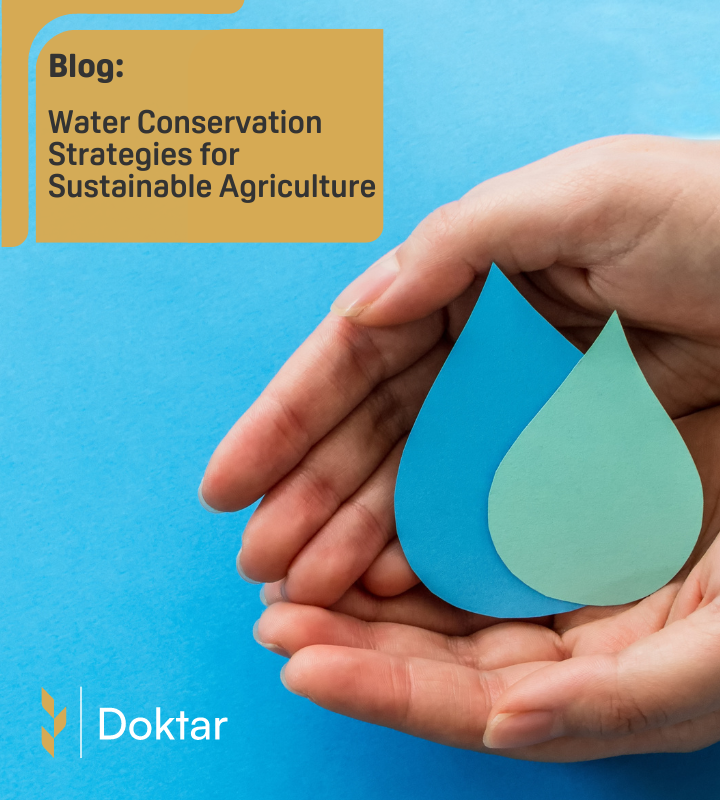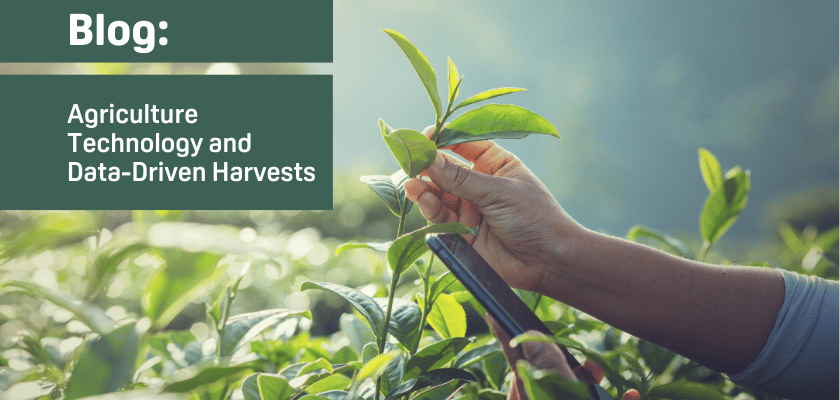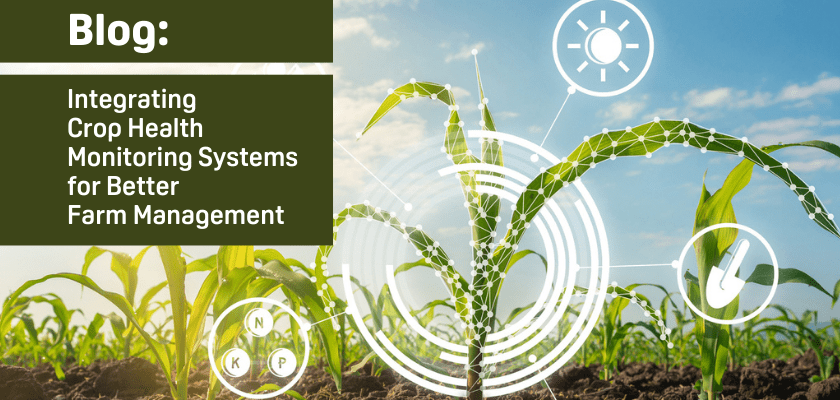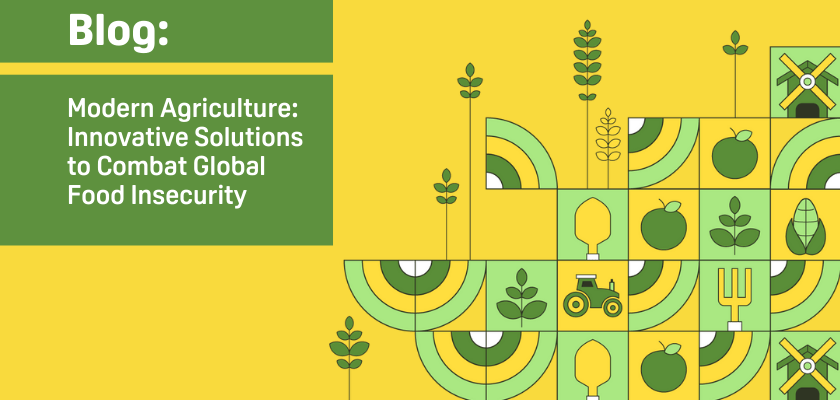

Water Conservation Strategies for Sustainable Agriculture
In our latest blog post, discover effective water conservation strategies for sustainable agriculture. Learn about innovative irrigation techniques, efficient water management practices, and their role in promoting sustainable farming.
Published on 04 June 2024
Water conservation is a critical component of sustainable agriculture, essential for maintaining productivity while preserving environmental resources. As the global population grows and climate change exacerbates water scarcity, adopting effective water management practices has never been more crucial. This blog delves into the significance of sustainability in agriculture, exploring various innovative irrigation techniques and efficient water management strategies. We also highlight the cutting-edge solutions provided by Doktar to help farmers optimize their water use, ensuring sustainable and resilient farming systems. Join us as we uncover the practices and technologies that can help balance agricultural productivity and environmental conservation.
What is Sustainability?
Sustainability refers to meeting our current needs without compromising the ability of future generations to meet theirs. It encompasses environmental sustainability, social equity, and economic viability. Environmental sustainability, in particular, focuses on conserving natural resources and reducing pollution to maintain the health of our ecosystems. This involves reducing carbon emissions, minimizing waste, and preserving biodiversity. Social equity within sustainability ensures all communities have access to resources and opportunities, promoting inclusiveness and fairness. Economic viability supports sustainable growth and development, ensuring economic activities do not harm the environment or deplete natural resources.
What is Sustainable Agriculture?
Sustainable agriculture is a method of farming that aims to meet society's food and textile needs without compromising the ability of future generations to meet their own needs. This approach to agriculture emphasizes long-term crop and livestock production with minimal environmental impact. Sustainable agriculture practices are designed to protect the environment, expand the Earth’s natural resource base, and maintain and improve soil fertility. It includes techniques such as crop rotation, agroforestry, and using organic fertilizers to enhance soil health and biodiversity. Moreover, it seeks to reduce chemical input dependency and promotes renewable resource use. Sustainable agriculture also supports the well-being of farming communities by fostering economic stability and improving the quality of life for farmers.
What is the Main Goal of Sustainable Agriculture?
The main goal of sustainable agriculture is to produce enough food to meet the population's needs while ensuring that the environment and resources are protected and conserved for future generations. Sustainable agriculture practices aim to improve soil health, minimize water use, reduce pollution, and enhance biodiversity. This approach ensures that farming remains viable and productive over the long term. It also focuses on maintaining ecological balance by integrating natural biological cycles and controls.
Sustainable agriculture supports economic viability by reducing input costs and increasing farm profitability through efficient resource use. Finally, it promotes resilience to climate change by adopting practices that mitigate its impact and enhance the adaptability of farming systems. By incorporating climate-smart agriculture techniques, farmers can reduce greenhouse gas emissions and sequester carbon in the soil. These practices help protect crops from extreme weather events, ensuring food security even in the face of changing climate conditions.
Why is Sustainability Important? Why is Sustainable Agriculture So Important?
Sustainability is crucial for preserving our environment, ensuring social equity, and promoting economic viability. In agriculture, sustainability is vital to ensure that farming practices do not deplete resources or cause irreversible environmental damage. Sustainable agriculture is important because it supports long-term food production, reduces environmental impact, conserves water and soil, and promotes biodiversity. It also helps farmers adapt to and mitigate the effects of climate change. Sustainable practices can improve soil fertility and structure, leading to higher yields and more resilient crops. Moreover, sustainable agriculture reduces the need for chemical inputs, which can pollute waterways and harm beneficial organisms. By fostering healthier ecosystems, sustainable farming practices also help to control pests and diseases naturally. Additionally, sustainable agriculture can enhance food security by ensuring that food production systems are resilient to environmental changes and economic disruptions. This approach also supports rural communities by providing stable incomes and improving farmers' overall quality of life.
What is the Current Greatest Threat to Agricultural Sustainability?
The greatest threat to agricultural sustainability is climate change. Changes in temperature, precipitation patterns, and the frequency of extreme weather events can significantly impact crop yields and soil health. Additionally, overuse of water resources, soil degradation, and biodiversity loss pose significant threats to sustainable agriculture. These factors can lead to reduced agricultural productivity and increased vulnerability to pests and diseases. Climate change exacerbates water scarcity, making efficient water management even more critical for sustaining agriculture. It also increases the frequency and severity of droughts and floods, which can devastate crops and livestock. The rise in global temperatures can shift growing seasons and make certain regions unsuitable for traditional crops. Moreover, climate change can disrupt pollination and other vital ecosystem services for crop production. Addressing these challenges requires a comprehensive approach that includes climate-smart agricultural practices and policies aimed at reducing greenhouse gas emissions and enhancing the resilience of farming systems.
What are Innovative Irrigation Techniques?
Innovative irrigation techniques are essential for conserving water and ensuring that crops receive the optimal amount of moisture. Some of the most effective techniques include:
- Drip Irrigation: Delivers water directly to the plant roots, minimizing evaporation and runoff.
- Sprinkler Systems: Simulate natural rainfall and can be adjusted for different crop needs.
- Subsurface Irrigation: Involves placing irrigation pipes below the soil surface to reduce evaporation and increase water efficiency.
- Smart Irrigation Systems: Use sensors and automated systems to monitor soil moisture and weather conditions, adjusting irrigation schedules accordingly.
These techniques not only conserve water but also improve crop yields and reduce labor costs.
What are the Roles of Efficient Water Management Practices in Sustainable Farming?
Efficient water management practices are critical for sustainable farming. These practices ensure that water resources are used wisely and conserved for future use. Key roles include:
- Improving Water Use Efficiency: By using techniques like drip irrigation and soil moisture sensors, farmers can reduce water waste and apply water only when and where it is needed.
- Reducing Runoff and Erosion: Proper irrigation practices can minimize soil erosion and nutrient runoff, protecting water quality in nearby streams and rivers.
- Enhancing Soil Moisture Retention: Practices such as mulching and cover cropping help retain soil moisture, reducing the need for frequent irrigation.
- Adapting to Climate Variability: Efficient water management helps farmers cope with periods of drought and irregular rainfall patterns, ensuring consistent crop production.
Doktar Products and Services for Water Conservation Strategies
Doktar offers a suite of advanced products and services for implementing effective water conservation strategies in sustainable agriculture. The Filiz Agricultural Sensor Station stands out by real-time soil and weather monitoring, enabling precise irrigation scheduling to avoid water wastage. Orbit Field Scout leverages satellite imagery to monitor crop health and identify areas with water stress, facilitating targeted irrigation and reducing overall water usage. The SoilScanner provides instant soil nutrient analysis, allowing for optimized fertilization that enhances soil moisture retention, reducing the need for frequent watering. Additionally, CropMap offers detailed insights into crop types and field boundaries, helping farmers plan and manage water resources more efficiently across different fields. These innovative solutions integrate IoT and AI technologies to support farmers in making data-driven decisions, ultimately promoting water conservation and sustainable farming practices.
Sustainable agriculture and efficient water management practices are essential for the future of farming. Farmers can ensure long-term productivity and environmental health by adopting innovative irrigation techniques and prioritizing sustainability. Embracing these strategies supports sustainable agriculture and promotes resilience in the face of climate change and other environmental challenges. Sustainable practices will be crucial in securing food production for future generations as we continue to innovate and adapt.
At Doktar, we are committed to revolutionizing agriculture through our advanced AI-powered solutions. For those interested in exploring how Doktar's innovative solutions can transform your agricultural practices, visit our website for detailed information on all our products. Stay updated with the latest developments by following us on Instagram and LinkedIn, where we share insights, tips, and updates about our technologies and their impact on modern farming. Our mission is to ensure every agronomic decision is based on accurate information and optimization for a healthier, sustainable, and tastier world. Join us in transforming agriculture and achieving a more sustainable future.

Agriculture Technology and Data-Driven Harvests
The convergence of agriculture technology and data-driven solutions represents the next frontier of innovation in farming. With companies like Doktar leading the way, farmers can leverage these advancements to improve productivity, reduce environmental impact, and secure a more sustainable future for agriculture. Whether through precision agriculture, sustainable agriculture, or cutting-edge smart agriculture technology, the future of farming is bright, and data is at the heart of this transformation. Technology's positive impact on this future should inspire and motivate us all.

Integrating Crop Health Monitoring Systems for Better Farm Management
Crop health monitoring systems revolutionize modern agriculture by enabling real-time insights into plant health, reducing losses, and promoting sustainability. Tools like Doktar’s CropMap and Orbit integrate advanced technologies, empowering farmers with data-driven decisions. By enhancing efficiency and sustainability, these systems are essential for future-proofing agricultural operations.

Modern Agriculture: Innovative Solutions to Combat Global Food Insecurity
Modern agriculture combats global food insecurity with precision agriculture, sustainable practices, and biotechnology. Tools like IoT, automation, and crop innovations optimize resource use, enhance resilience, and ensure stable food supplies. By integrating smart technologies, agribusinesses address challenges like climate change and resource scarcity, paving the way for a sustainable food future.
